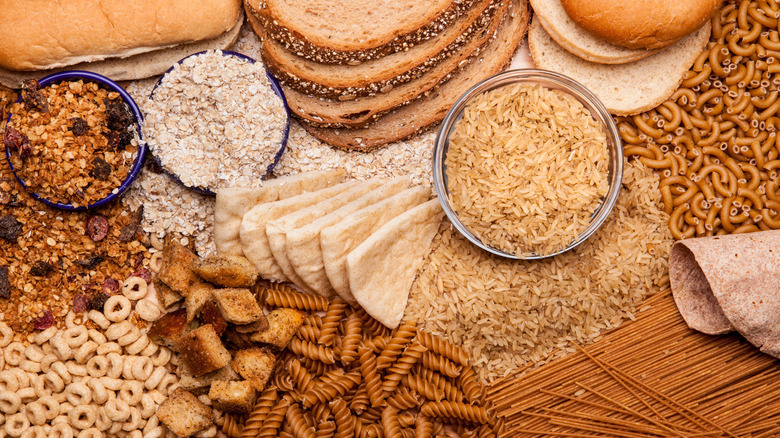A Surprising Side Effect Of Only Eating Whole Grains
Eating a well-balanced diet is an important part of maintaining a healthy lifestyle. Nutrition experts recommend that over 50% of your daily grain intake should come from whole grains (via Mayo Clinic). The complex carbohydrates they contain may help lower your risk of cardiovascular disease, certain cancers, and diabetes. And while they do contain key vitamins and minerals that are essential for your body to function, some people who eat a whole grain diet may be missing out on some important nutrients.
Whole grains are considered to be healthier than refined grains, their processed counterparts. They have more fiber, protein, and vitamins than refined grains (via Healthline). They also contain significant amounts of antioxidants and minerals. Refined grains have had some of the most nutritious parts of the grain removed in order to make them more shelf stable and easier to digest. Companies often add vitamins or minerals back into the food product to make them more nutritious, but most still don't compare to the unprocessed versions. That's because the parts that are removed, the germ and bran, contain almost all of the fiber and nutrients in the grain. White flour and white rice are some of the most common examples of refined grains. You can find them as ingredients in pasta, breads, and most cereals.
If you plan to become pregnant, you need more of this
One of the most important nutrients removed from whole grains when they're processed, is folate. A type of B vitamin, folate can be found in beans, nuts, dark leafy greens, and more (via Mayo Clinic). It's an essential ingredient in the formation of red blood cells, and cells need it to function properly. People who are planning to become pregnant are most in need of extra folate in order to prevent neural tube birth defects. While most adults only require about 400 micrograms of folate per day, people who may become pregnant should be consuming between 400 and 1,000 micrograms per day to help with fetal formation.
While most people can get the recommended amount of folate from a balanced diet, those who require higher amounts and tend to eat a whole grain diet should be sure to eat foods fortified with folic acid. Doctors also recommend taking folic acid supplements for prenatal care. And before you cut healthy whole grains like oatmeal, whole wheat pasta, and brown rice out of your diet, remember that eating balanced meals and taking folic acid supplements should be plenty to keep levels of folic acid at a healthy level (via Cleveland Clinic).

